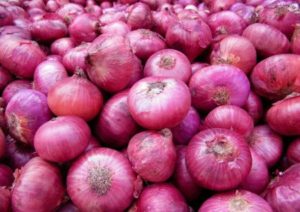[ad_1]

Mr Ali Umar, Public Relations Officer, Onion Sellers Association of Ghana, told the Ghana News Agency that about 70 per cent of onions in Ghana came from Niger and that restrictions on import would negatively affect supply.
“If Niger’s borders remain closed for long, it will really affect our onion business. It will lead to hikes in prices,” Mr Umar stated.
He indicated that besides Niger, about 20 per cent of Ghana’s onions were imported from Nigeria, five per cent from Burkina Faso, and about five per cent was locally produced.
The PRO said because onion was perishable, he was hopeful there would be some consideration from Niger to allow the commodity to be imported into Ghana amid the restrictions.
He said in previous instances of restrictions, particularly in Burkina Faso, border officials granted exemptions to some commodities, especially onions and urged ECOWAS to engage the current leaders of Niger so that some commodities could be allowed to move into and out of the country.
Mr Umar indicated that Ghana was the largest supplier of salt to Niger and that the border restrictions would equally affect the export of salt to Niger.
“The countries should be able to negotiate so that food stuffs can be distributed between Niger and the rest of the West African sub-region because people will need to eat to survive. If there is no movement of goods, there is going to be hardship,” Mr Umar said.
Mr Emmanuel Doni-Kwame, Secretary-General, International Chamber of Commerce (ICC), Ghana, said the current border restrictions on Niger meant that the other producers of onions would have to step up production to fill the potential gap.
He said it was particularly an opportunity for Ghana to take up onion cultivation to boost local production, adding that inability to fill the gap would result in increased prices.
Concerning the current state of Niger, Mr Doni-Kwame said: “The most important thing is to make sure there is enough security, there is respect for rule of law and human rights, and to make sure the economic system is not disrupted.”
West African leaders on Sunday announced a raft of sanctions on Niger following the country’s military coup d’état, which pushed Mohamed Bazoum out of government, with Abdourahmane Tchiani, declaring himself Niger’s new leader.
Among the sanctions are with immediate effect, the closure of land and air borders between ECOWAS countries and Niger, institution of ECOWAS no-fly zone on all commercial flights to and from Niger, and suspension of all commercial and financial transactions between ECOWAS Member States and Niger.
Source: GNA
[ad_2]
Source link
